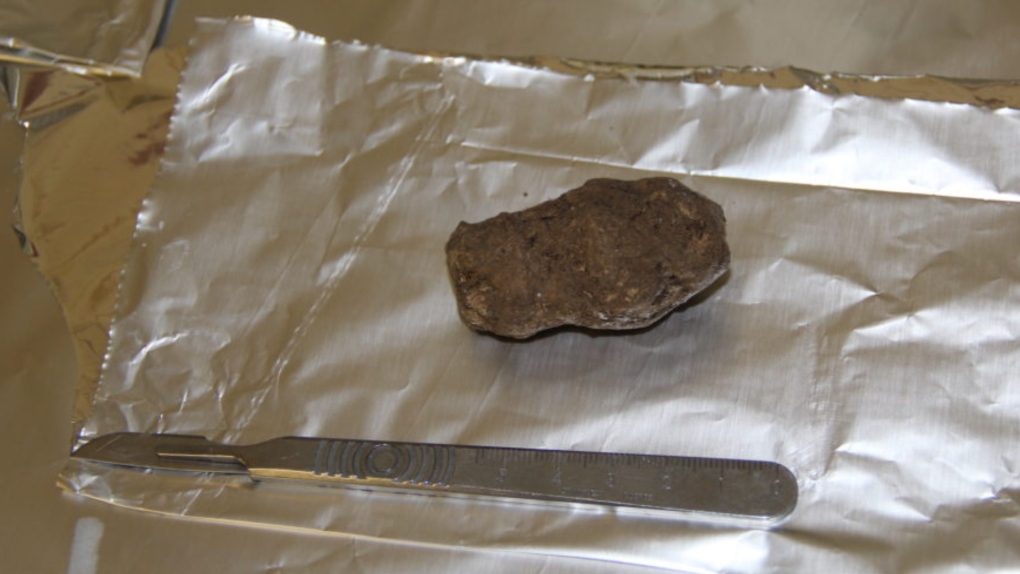300-year-old dog feces, so well preserved that 'odour was present,' hints relationship with humans
 Dog paleofeces is shown in an image provided by the University of British Columbia. (Katharina Dulias)
Dog paleofeces is shown in an image provided by the University of British Columbia. (Katharina Dulias)
A sample of frozen dog feces is giving researchers an idea of what the relationship between canines and humans was like in the 17th century.
Researchers from the University of British Columbia say the feces reveals what Arctic sled dogs ate, information that may help scientists understand how dogs were treated by humans at the time.
It may also help to determine how dogs' gastrointestinal health has evolved, according to UBC anthropologist Camilla Speller.
Speller is the senior author of an international study released Wednesday on the research. The study was published in the scientific journal Proceedings of the Royal Society B: Biological Sciences.
In a news release from the university, Speller said proteins were extracted from the fecal sample – a process undertaken for the first time ever.
"The recovered proteins reveal that the sled dogs consumed muscle, bone, intestines and roe from a range of salmon species including Chinook, Sockeye, Coho and Chum," Speller said.
Despite being 300 years old, the sample of what UBC researchers call "paleofeces" was so well preserved in Arctic permafrost in Alaska that, as described in a news release, "odour was present when the feces were broken in half."
A lead researcher on the study, PhD student Anne Katherine Wiborg Runge, said it's only recently that the canine-human relationship has become a topic of interest for those in the field.
"In the Arctic, dogs rely exclusively on humans for food during the winter but deciphering the details of provisioning strategies has been challenging," the student from the University of York said in a statement.
She said salmon eggs suggest the feces was "deposited" in the summer.
"The dogs may have been fed differently or less frequently in summer, or been let loose to fend for themselves," Wiborg Runge said. "Working sled dogs are a particularly expensive resource, requiring up to 3.2 kg of fish or meat every day and provisioning of dogs would therefore have played a significant role in the food procurement strategies of past Arctic culture."
CTVNews.ca Top Stories

How quietly promised law changes in the 2024 federal budget could impact your day-to-day life
The 2024 federal budget released last week includes numerous big spending promises that have garnered headlines. But, tucked into the 416-page document are also series of smaller items, such as promising to amend the law regarding infant formula and to force banks to label government rebates, that you may have missed.
Which foods have the most plastics? You may be surprised
'How much plastic will you have for dinner, sir? And you, ma'am?' While that may seem like a line from a satirical skit on Saturday Night Live, research is showing it's much too close to reality.
opinion I've been a criminal attorney for decades. Here's what I think about the case against Trump
Joey Jackson, a criminal defence attorney and a legal analyst for CNN, outlines what he thinks about the criminal case against Donald Trump in the 'hush money trial.'
$3.8M home in B.C.'s Okanagan has steel shell for extra wildfire protection
A home in B.C.'s Okanagan that features a weathering steel shell designed to provide some protection against wildfires has been listed for sale at $3.8 million.
Diver pinned under water by an alligator figured he had choice. Lose his arm or lose his life
An alligator attacked a diver on April 15 as he surfaced from his dive, nearly out of air. His tank emptied with the gator's jaws crushing the arm he put up in defence.
Psychologist becomes first person in Peru to die by euthanasia after fighting in court for years
A Peruvian psychologist who suffered from an incurable disease that weakened her muscles and had her confined to her bed for several years, died by euthanasia, her lawyer said Monday, becoming the first person in the country to obtain the right to die with medical assistance.
Mystery surrounds giant custom Canucks jerseys worn by Lions Gate Bridge statues
The giant stone statues guarding the Lions Gate Bridge have been dressed in custom Vancouver Canucks jerseys as the NHL playoffs get underway.
Celebrity designer sentenced to 18 months in prison for smuggling crocodile handbags
A leading fashion designer whose accessories were used by celebrities from Britney Spears to the cast of the 'Sex and the City' TV series was sentenced Monday to 18 months in prison after pleading guilty in Miami federal court on charges of smuggling crocodile handbags from her native Colombia.
Wildfire leads to evacuation order issued for northeast Alberta community
An evacuation order was issued on Monday afternoon for homes in the area of Cold Lake First Nation.
































